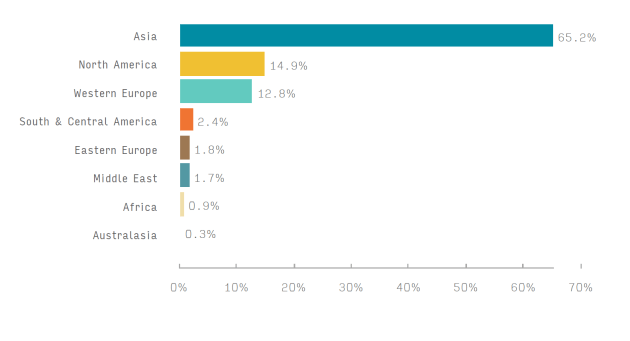Sustainability demands will push further growth in sales of cartonboard, microflute and miniflute packaging, according to the latest data from Smithers.
It found that in 2023, actual consumption of these paperboard formats will reach a projected 56.8 million tonnes worldwide, up from 47.8 million tonnes in 2019.
The latest market report by Smithers, The Future of Folding Cartons to 2028, shows this will reach 77.3 million tonnes in 2028, equivalent to a compound annual growth rate (CAGR) of +6.4 per cent.
Across the same period, value of cartonboard will increase from $60.4 billion to $79.7 billion (at constant prices), equivalent to a CAGR of +5.7 per cent, while the global value of converted folding carton packaging will reach $199 billion in 2023, and then increase to $274.5 billion in 2028.
Analysis of the 24 end-use applications included in Smithers’ extensive data set reveals folding carton use will remain fairly evenly split between food and beverage, and other applications.
Much new growth is coming from evolving existing paper technologies to replace plastics, supported by legislation, such as the forthcoming revision of the Packaging and Waste Directive in Europe. This includes new formats in fresh produce, food service, beverage multipacks, ready meals, home, and personal care.
The fast-growing sectors across the next five years will be dry foods, confectionery, healthcare, personal care, and chilled food.
Acceptance in several of these is conditional on deploying improved coating technology to protect fibers from wet or fatty foods, and present a premium print surface. Smithers estimates that nearly 70 per cent of all cartonboard packaging carries a coating of some form.
In 2023, 90 per cent of these coatings by weight are thermoplastic polymers or aluminium, and there is a premium to develop for functional coatings that do not compromise fiber recyclability.
Paper mills are taking steps to upgrade machines to enable or improve inline coating on the paper machine to meet the growing demand for these types of coated cartonboard.
Luxury packaging remains a major target for many suppliers, with new premium grades entering the market combining superior print surfaces, with greater recyclability credentials. This is seen to be stimulating greater demand for virgin pulp cartonboards.
Simultaneously, there is an impetus to add smart tracking technology to folding cartons, giving greater supply chain insight, and protecting high-value goods against counterfeiting.
The market is also having to negotiate price disruption. Raw material prices rose by over 25 per cent in 2022 following a 14 per cent increase in 2021. In the short-term, this is creating a febrile marketplace, even as new folding carton assets come online.
A total of over six million tonnes of production capacity entered the market between 2020 and 2022, which gives a global installed capacity in 2022 of over 59 million tonnes, providing a buffer of some five million tonnes.
Paper mills, especially in Europe, are increasingly investing in more energy-efficient equipment, and even trialling alternative pulp supplies. This is reflected in an increased consumption of uncoated recycled board (URB), although coated recycled board (CRB)/white-lined chipboard (WLC) and folding boxboard (FBB) will continue to represent the majority of the market.
Booming demand for dedicated e-commerce formats has translated into an acceleration of demand for microflute packaging, featuring a litho-laminated outer layer of cartonboard applied to the single-face corrugated under-layers.
Over time, it is anticipated that some of this cartonboard market will be eroded by the use of linerboard, thereby removing the need for a separate lamination process.
The Future of Folding Cartons to 2028 is available to purchase now from the Smithers website.







